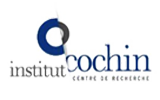


Genetics of the immune system and chronic inflammatory rheumatic diseases
news

Inserm
Jérôme Avouac received an INSERM “Contrat d’Interface” 2015-2018 grant based on the project entitled “Endotheliopathy of Autoimmune Rheumatic Disorders”[Dec 2014]

Atip/Avenir
The Allanore lab received an Atip/Avenir Grant from the French government [Jan 2014]

ANR «Chair of Excellence» Grant
The Giraud lab received «Chair of Excellence» Grant from the French government [Jul 2011]
Summary
Immune-mediated diseases comprise a clinically heterogeneous group of diseases affecting about 5% of individuals of European origin. Knowledge of their pathogenic mechanisms has strikingly increased these recent years taking advantage of the huge progresses made in immunogenetics.
Our research offers a unique opportunity both in basic and in translational approaches to continue the deciphering of immunogenic disorders. Our goal is to link inflammation and immune system with human diseases based on a multidisciplinary approach which involves a two-way process going back and forth between the analysis of the genetic data, the dissection of immunological mechanisms and the potential transfer of the findings to the patient management. Indeed, our main research interest is to decipher the molecular mechanisms leading to the establishment of immune tolerance to self and therefore preventing autoimmune manifestations and diseases.
Three main pillars constitute the organization of the research program within the team: 1) regulation of auto-antigen expression, 2) Genomic analysis of the immune mediated disease with diagnostic, prognostic and therapeutic applications, 3) Functional validation of raised pathways using in vitro and animal models.
The AIRE protein has been identified to induce a broad spectrum of auto-antigens in the thymus whose processed peptides are presented to maturing T cells. “Self-reactive” T cells are eliminated in the thymus, preventing their escape to the periphery and the occurrence of autoimmune manifestations. The mode of action of AIRE is unique by the large number of genes that it is able to induce and also by the fact that auto-antigens are significantly over-represented in its signature. AIRE is capable to «wake up» silenced genes by impacting chromosomal regions bearing repressed chromatin marks. By focusing on AIRE, the main research interest of the group is to decipher the molecular mechanisms leading to the establishment of immune tolerance to self and therefore preventing autoimmune manifestations and diseases.
Systemic sclerosis (SSc) is an orphan disease characterized by vascular, immune and connective tissue anomalies. Among the many different immune-mediated rheumatic diseases, SSc stands out as a severely incapacitating and life-threatening disease, the pathogenesis of which is largely unknown and for which therapeutic options are few and insufficient. It results from perturbations of effector cells and soluble mediators of the immune system, on the one hand, and local target interstitial tissue abnormalities, on the other. The aim of our team is to increase understanding of mechanisms through the identification of new genes contributing to SSc and to unravel the functional characterization of their involvement. Starting from large clinical investigations through fruitful national, European and worldwide networks, and based on genetic and genomic approaches, we use in vitro cellular assays or suitable animal models when needed.
Similar approaches are also developed in Rheumatoid arthritis with specific interest on angiogenesis in the perpetuation of synovitis and the role of cell death through FADD investigations.
Our ultimate goal is to help development of new diagnostic and therapeutic strategies based on pathophysiological grounds. The interactions between scientists and physicians in the team contribute importantly to the translation of fundamental research into clinical application.


